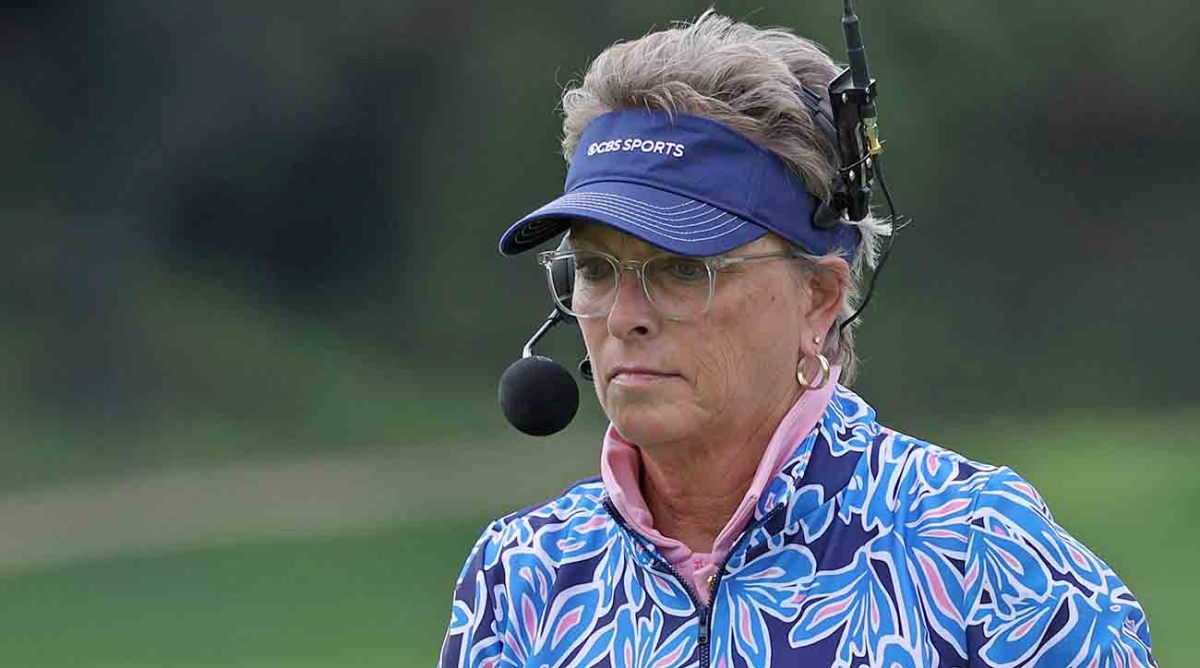Straight-Shooting Dottie Pepper Dishes on LPGA Coverage and Solheim Cup Dilemmas

Dottie Pepper has been around for a long time, a testament not to her age, but the quality of her work. Seventeen victories and a pair of major titles during her 17 years on the LPGA Tour, another 17 as an analyst with NBC and CBS—Pepper and Judy Rankin are the only women to cover men’s golf for a primary network on a regular basis.
As fiery as she could be as a player, Pepper’s steady, understated method of on-course reporting has streamlined the standard in a job that requires far more than simply walking and talking. She joined CBS in late 2015 after David Feherty took his sack of quips to NBC, tidying up a conflict of sorts in that his talk show Feherty had already become a staple on Golf Channel. If the Northern Irishman’s brand of disheveled brilliance was a commodity unto itself, if the late Bob Rosburg basically defined the role of following a lead group and describing the action from up close—skepticism inviting pessimism—Pepper is the umpire behind the plate who doesn’t miss a ball/strike call all night.
The departure of Nick Faldo makes her the only commentator at either network with multiple major championships. In a competitive context, Pepper’s career bore a strong resemblance to that of NBC lead voice Paul Azinger: a top-tier American golfer for much of the 1990s who didn’t hang on forever, a high-octane leader at team events who never backed down, a highly relevant voice whose transition to television wasn’t so much effortless as inevitable.

Dottie is a thinker. CBS doesn’t pay her to enlighten viewers with her opinions, per se, but she has never suffered from a shortage of them. Ask her about the differences in public perception between men’s and women’s pro golf. You’ll get a fastball on the inside corner—an intrinsically diagrammed answer from an incomparably qualified source on the topic.
“There’s a shot, shot, shot mentality to the women’s telecasts, and that’s where the LPGA has gotten off track,” Pepper says. “We don’t see the players as people, and if the network doesn’t give us a reason to root for them, why should we bother to watch?”
She also drives home a point so obvious that most of us never notice. Whereas the PGA Tour holds the latter half of weekend-afternoon airtime throughout the season, the LPGA bounces all over the place. There is no contractual commitment to a consistent time slot, so if you want to root for somebody, you’ll need a Golf Channel production assistant to assume complete control of the remote. As for the large contingent of LPGA players whose Asian heritage is considered detrimental to the product by some, Pepper doesn’t need to catch her breath before offering a response.
“A lot of these kids with Asian names are just as American as you and I,” she replies. “That’s part of the [lack of humanizing] the players that’s holding it all back.”
Next week’s Solheim Cup should be an event of greater significance than it has warranted to date, and with 11 of the top 25 in the Rolex Rankings hailing from Asia, the U.S.-vs.-Europe clash has become compromised by its nationalistic constrictions. This year’s roster of Yanks includes Lexi Thompson, who has made three cuts in 11 starts this season and hasn’t won a tournament since 2019. With all due respect to the mathematicians who oversee the Rolex arithmetic, Thompson’s current ranking (26th) should be followed by some sort of delusory accommodation.
If Roger Maris had to live with an asterisk, so should Thompson.
Thompson wasn’t given one of Stacy Lewis’s captain’s picks—she actually qualified for the team by virtue of that ranking. It’s all part of the world we live in, even when it spins in the wrong direction. “Either you overhaul the system, or the player has to take herself out of it, which I happen to have some experience with,” Pepper says. Indeed, she underwent shoulder surgery in early February 2002, about 7 and a half months before the matches in Minneapolis, and entered just two events that year.
Because she had a terrific first half in 2001, however—eight top fives in 12 starts through May—Pepper earned an automatic berth. “I had tried to play but couldn’t go more than 18 holes, and I would’ve handicapped my captain [Patty Sheehan],” she says. America’s firestarter gave up her spot to Kelli Kuehne, who lost all four of her matches, but the U.S. beat Europe by three.
The one place Pepper won’t go is the ballot box to cast a vote on whether Thompson should do the same or trust her game. “By the terms of the captain’s agreements, she made the team,” Dottie says. “It might be just the spark she needs.”
It also ties everything together into one pretty bow, largely unseen. When Justin Thomas gets a spot on the Ryder Cup squad after what for him was a lousy year, the issue doubles as a forum bedecked in hundreds of passionate viewpoints. When Lexi Thompson goes nine months without breaking an egg and qualifies, no hell breaks loose. Hell doesn’t even bother to fill out a parole request. The LPGA has a good product that comes with immense marketing challenges; the monolithic presence of the PGA Tour and the bubbling earthquake accompanying its proposed alliance with LIV Golf haven’t done the players even the tiniest favor.
Pepper will skip next week’s Solheim Cup festivities in southern Spain, in part because she’s not working, in part because she has always cherished her time off and because she spends most of that time in the scenic, cultural burg known as Saratoga Springs, New York. It’s a place where perception greets reality with a handshake, the town in which Dottie Pepper was born and raised.
“It bothers me that people think you have to support something just because it’s the right thing to do,” she says. “The LPGA is good enough to stand for itself. It’s pretty darn good. Good enough to get the respect it has earned, not just because it deserves it.”
